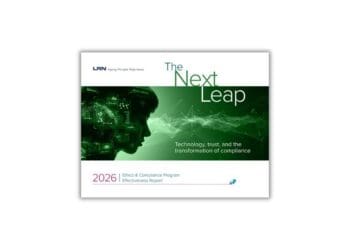Following an April vote by the European Parliament, potential whistleblowers in the EU member states can expect greater protections. GAN Integrity’s Pauline Blondet discusses what businesses should do now to strengthen their ethics and compliance programs accordingly.
The European Parliament recently approved an enhanced and unified whistleblower protection across the European Union’s member states. In order to be ready for the directive when its provisions enter into force in their respective member states, companies need to start working on enhancing their ethics and integrity culture now.
Why? Because the directive requires companies of a certain size to establish well-designed internal whistleblowing procedures and grants dramatically expanded protections to whistleblowers, including the right to bypass internal channels and enjoy protection should they elect to go straight to the authorities.
In other words, whistleblowers are now protected if they choose to alert the authorities directly, with no obligation to use the internal reporting channels implemented by companies.
This means an increased risk of disclosure to the authorities for companies in which employees feel that they cannot trust the internal system (for example, they may not feel confident that their report will be taken seriously or handled in confidentiality or that they won’t face retaliation).
As a result, companies will have to step up their efforts to ensure their employees feel confident enough to use internal reporting channels; this is vastly linked with building a culture of integrity in-house.
As for every threat, this is also a fantastic opportunity for companies to look within and reflect on building a culture of trust and integrity.
As businesses think about what role ethics plays in their organizations currently — and then on the role it should be playing under the new directive — they will start to look for the most effective ways to ensure people feel comfortable and confident to raise their concerns internally.
Here are five effective tips to foster an environment in which employees feel they will be supported if they report a concern.
What Companies Must Do to Build a Culture of Trust
1. Be clear about their commitment to integrity and practice an active open-door policy
Creating a strong culture of integrity first comes with top and middle management setting the tone and acting in an exemplary way, actively asserting and showing that integrity is at the heart of the way everybody does business.
Even though automated hotlines and anonymized ways to report concerns are a must, an employee seeking to raise a concern will always first be inclined to speak to a human. In informing employees about the various ways they can raise concerns, it should be made very clear that many doors are open to receive concerns or questions. The more the merrier: HR, legal and compliance should all be able to receive reports and concerns.
As is often the case in ethics and compliance, communicating is far from enough. Businesses should practice an open-door policy daily, and departments likely to receive concerns from employees should be trained accordingly on how to receive such concerns and respond to the person who raised it, what parties to inform immediately to make sure the report is handled internally and how to ensure confidentiality.
Beyond being available to speak with employees, these departments should be generally welcoming and understanding so employees feel comfortable approaching them with questions and concerns.
2. Be transparent about the reporting and investigation processes
Employees should know in advance exactly how their report is going to be handled. Why would employees report something internally if they have no idea what is likely to happen next?
What happens when potential misconduct is first reported? Is the report confidential? What is the investigation process like? Who will investigate, who will decide? Will they be kept posted of what is happening? How is this process documented? What is likely to happen to the person designated in the report? Is their report going to help avoiding such breaches in the future?
Outline every step of the process, and make sure it is documented internally and easily accessible to all employees. The more education on processes and their availability, the better.
Employees can only trust the game if they know the rules by which it is played.
3. Effectively sanction wrongdoings
Creating a culture of integrity in which employees feel they can raise concerns is deeply connected with effectively enforcing rules businesses decide to set for themselves. Violations must be followed by consequences to create a culture of trust in which employees feel they can speak up.
In practice, these consequences should be very clearly underlined in the code of conduct and internal rules. Of course, wrongdoers should be sanctioned in a proportionate but effective manner, but don’t forget their management. Managers should not escape scrutiny, as they have allowed violations to take place under their watch in the first place.
4. Communicate about the fact that wrongdoings are systematically sanctioned
No matter how systematically wrongdoings are sanctioned in a given company, culture cannot be impacted if the company does not communicate to employees about these sanctions. Implementing regular reporting, communication or newsletter that states on a no-name basis how many cases of internal rules violations have occurred and the consequences that followed will keep employees confident that the company is taking reports and violations seriously.
Using these concrete anonymized fact cases to train employees on the internal rules does not only make compliance jobs easier, but also proves to be extremely effective and deterring.
Violations are also a sign that the internal processes at stake should be reviewed, challenged and strengthened. These signals should be used to improve the processes, but also to communicate globally to all about how the compliance program improves over time.
5. Actively incentivize good behavior
How can a company effectively promote good behavior if employees are incentivized only on turnover?
This sends a conflicting and somewhat perverse message: Companies are asking employees to follow the rules, but they are also rewarding them based exclusively on the money they help the company make.
Companies should take this opportunity to assess the effects their incentive systems may have on employees’ conduct.
To make sure people do the right thing, make ethical behavior a significant metric for yearly assessment and bonuses. Ethical or unethical behavior should also be taken into account when considering promotions and advancement, as well as key career moves.
The whistleblower directive is a sea change moment for businesses in the EU and an unmissable opportunity to ramp up the focus on ethics and compliance in organizations as the best defense against misconduct and its many consequences. When violations occur, the hard point is not to have a whistleblowing channel in place, but rather to make sure employees feel that they can use it and that their concerns will be handled appropriately. If companies don’t, it is very simple: Employees will go straight to the authorities. The provisions of the directive are entering into force in their member states; to prepare, companies should focus more than ever on creating a culture of trust in which employees feel they will be supported in doing the right thing.



 Pauline Blondet is Vice President Compliance EMEA at
Pauline Blondet is Vice President Compliance EMEA at 







